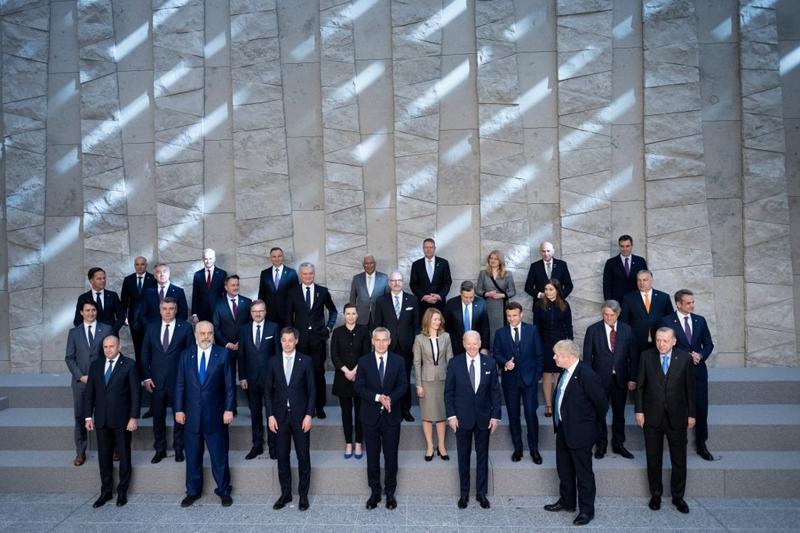 British Prime Minister Boris Johnson (second right) looks at US President Joe Biden (third right) while posing for a family photograph with NATO Secretary General Jens Stoltenberg (center), Turkey's President Recep Tayyip Erdogan (right) and other leaders as they pose for a family photograph ahead of an extraordinary summit at NATO Headquarters in Brussels on March 24, 2022. (BRENDAN SMIALOWSKI / POOL / AFP)
British Prime Minister Boris Johnson (second right) looks at US President Joe Biden (third right) while posing for a family photograph with NATO Secretary General Jens Stoltenberg (center), Turkey's President Recep Tayyip Erdogan (right) and other leaders as they pose for a family photograph ahead of an extraordinary summit at NATO Headquarters in Brussels on March 24, 2022. (BRENDAN SMIALOWSKI / POOL / AFP)
BRUSSELS – The North Atlantic Treaty Organization allies gathered here on Thursday, for what Secretary General Jens Stoltenberg called "an extraordinary NATO summit in an extraordinary security situation" amid the Ukraine crisis.
The meeting, held on the day that marked one month since the start of Russia's special military operation in Ukraine, might temporarily boost unity across the Atlantic, but could not easily balance the demands of relevant parties or put out the fires in Ukraine.
Behind closed doors, NATO heads of state and government agreed to form four new NATO battlegroups in Bulgaria, Hungary, Romania and Slovakia, to supplement the four established ones in Estonia, Latvia, Lithuania and Poland. They also agreed to strengthen "longer term deterrence and defense posture" supported by "enhanced exercises."
READ MORE: Claim of NATO chief false news 'in itself '
Stoltenberg also said that NATO will strengthen the cyber defenses and offer Ukraine cybersecurity assistance.
In the statement after the gathering, there was no agreement to impose additional sanctions against Russia, especially the country's oil and gas products. This demonstrates the obvious divergence among NATO members, who have different security and economic concerns.
The worst thing during the war is not having clear answers to requests for help.
Volodymyr Zelensky, President, Ukraine
The biggest difference is whether to place sanctions on Russia's energy industry. German Chancellor Olaf Scholz has clearly expressed opposition to such penalties.
Upon his arrival for a summit with leaders of the EU countries on Thursday, Belgian Prime Minister Alexander De Croo warned that the 27-member bloc should not consider sanctions against Russia as such a move would unnecessarily weaken its economy.
In contrast with the Western European states, some countries adjacent to Russia such as Latvia and Estonia are calling for stricter sanctions against Russia as they claimed that energy sanctions would be a crucial measure to stop the country's military operation in Ukraine.
In order to cut dependence on Russia's gas and oil, the EU is seeking long-term liquefied natural gas supplies from the United States, making the latter a beneficiary of the European energy crisis prompted by the Russia-Ukraine conflict.
Besides the divergence on sanctions, the NATO members in Brussels also shied away from Ukraine's request for more advanced weapons systems, participations of NATO troops and a no-fly zone in Ukraine.
Ukraine President Volodymyr Zelensky, invited to address the NATO leaders, hit out at Western nations for not doing enough to help his country.
"You have thousands of fighter jets! But we haven't been given any yet ... You have at least 20,000 tanks! Ukraine asked for a percent, one percent of all your tanks to be given or sold to us! But we do not have a clear answer yet ... The worst thing during the war is not having clear answers to requests for help," Zelensky said during the meeting.
ALSO READ: China supports UN's role in Ukraine's humanitarian issue
NATO has been clear it will not send troops or planes to the battlefield.
"We have a responsibility to ensure that the war does not escalate beyond Ukraine ... this would cause even more death and even more destruction," Stoltenberg said on Wednesday.


